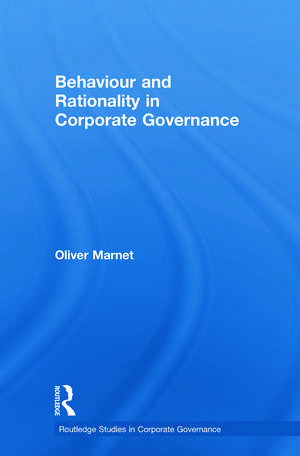Behaviour and Rationality in Corporate Governance: Routledge Studies in Corporate Governance
Autor Oliver Marneten Limba Engleză Paperback – 7 mar 2011
This book is unique in that it draws together various strands of the literature on corporate governance, accounting, law, cognitive research, psychology, behavioural economics and conventional economics to shed light on questions regarding the feasibility of independence and impartiality of boards of directors and external auditors as monitors and gatekeepers in corporate governance. The book is essential reading for professional accountants and auditors, directors, regulators, law makers, corporate lawyers, and investment bankers. It will appeal to all those interested in behavioural economics and corporate governance.
| Toate formatele și edițiile | Preț | Express |
|---|---|---|
| Paperback (1) | 418.22 lei 43-57 zile | |
| Taylor & Francis – 7 mar 2011 | 418.22 lei 43-57 zile | |
| Hardback (1) | 1065.06 lei 43-57 zile | |
| Taylor & Francis – 19 mar 2008 | 1065.06 lei 43-57 zile |
Din seria Routledge Studies in Corporate Governance
-
 Preț: 356.90 lei
Preț: 356.90 lei -
 Preț: 308.96 lei
Preț: 308.96 lei -
 Preț: 502.75 lei
Preț: 502.75 lei -
 Preț: 210.05 lei
Preț: 210.05 lei -
 Preț: 427.32 lei
Preț: 427.32 lei -
 Preț: 389.38 lei
Preț: 389.38 lei -
 Preț: 284.52 lei
Preț: 284.52 lei -
 Preț: 411.42 lei
Preț: 411.42 lei -
 Preț: 415.24 lei
Preț: 415.24 lei -
 Preț: 381.98 lei
Preț: 381.98 lei -
 Preț: 385.47 lei
Preț: 385.47 lei -
 Preț: 382.75 lei
Preț: 382.75 lei -
 Preț: 393.81 lei
Preț: 393.81 lei -
 Preț: 381.89 lei
Preț: 381.89 lei - 21%
 Preț: 259.10 lei
Preț: 259.10 lei -
 Preț: 361.85 lei
Preț: 361.85 lei -
 Preț: 381.59 lei
Preț: 381.59 lei -
 Preț: 387.38 lei
Preț: 387.38 lei -
 Preț: 430.52 lei
Preț: 430.52 lei -
 Preț: 392.93 lei
Preț: 392.93 lei - 18%
 Preț: 1002.36 lei
Preț: 1002.36 lei -
 Preț: 390.80 lei
Preț: 390.80 lei - 18%
 Preț: 946.79 lei
Preț: 946.79 lei - 18%
 Preț: 1002.68 lei
Preț: 1002.68 lei
Preț: 418.22 lei
Nou
Puncte Express: 627
Preț estimativ în valută:
80.05€ • 86.98$ • 67.29£
80.05€ • 86.98$ • 67.29£
Carte tipărită la comandă
Livrare economică 21 aprilie-05 mai
Preluare comenzi: 021 569.72.76
Specificații
ISBN-13: 9780415620345
ISBN-10: 0415620341
Pagini: 320
Ilustrații: 7 b/w images, 9 tables and 7 line drawings
Dimensiuni: 156 x 234 x 17 mm
Greutate: 0.5 kg
Ediția:1
Editura: Taylor & Francis
Colecția Routledge
Seria Routledge Studies in Corporate Governance
Locul publicării:Oxford, United Kingdom
ISBN-10: 0415620341
Pagini: 320
Ilustrații: 7 b/w images, 9 tables and 7 line drawings
Dimensiuni: 156 x 234 x 17 mm
Greutate: 0.5 kg
Ediția:1
Editura: Taylor & Francis
Colecția Routledge
Seria Routledge Studies in Corporate Governance
Locul publicării:Oxford, United Kingdom
Public țintă
Postgraduate and UndergraduateRecenzii
‘Marnet provides a rich overview of important issues related to the role of external auditors and board members in corporate governance. Throughout the book, Marnet provides a strong empirical foundation for his arguments. The broad literature review and its application to prominent fraud scandals, the Asian Financial Crisis of 1997/1998 and the failure of Germany's Neuer Markt provide interesting directions for young researchers, regulators, and the key players of corporate governance. The book may be used as a supplementary reference in a corporate governance course for Masters or PhD students or as a rich source of inspiration for behavioral corporate governance researchers. The book is a pleasure to read and despite the rapid growth of literature on judgment and decision-making, it raises many issues that remain relevant for our understanding and the improvement of corporate governance.’ – Florian Hoos, HEC Paris, Jouy-en-Josas, France
Cuprins
1. Introduction 2. Overview of Corporate Governance 3. Earnings Management 4. Rationality or Rational Behaviour? 5. Behaviour and Rationality in Corporate Governance 6. Independence of Auditors and Directors 7. Recent Corporate Governance Failures 8. Implications for Governance Policy 9. Conclusion
Notă biografică
Oliver Marnet is a Lecturer at the University of Exeter Business School.
Descriere
Corporate scandals due to bad accounting happen too frequently for a system of corporate governance to be deemed effective. Exploring the reasons behind corporate misbehaviour, this book also answers the question of whether recent reforms are sufficient to prevent further scandals from occurring in the future.



















